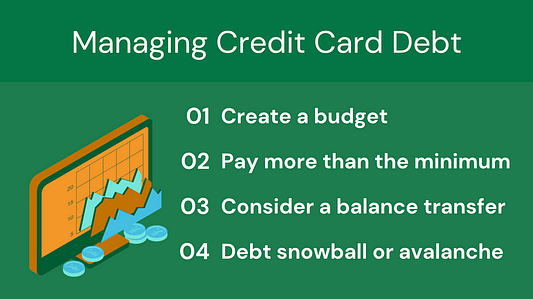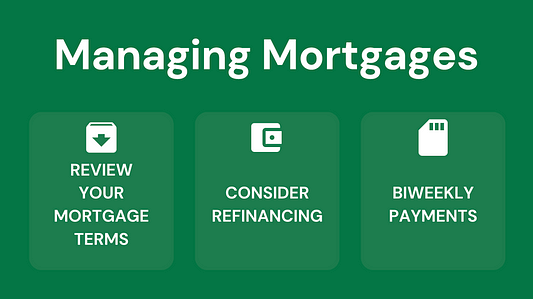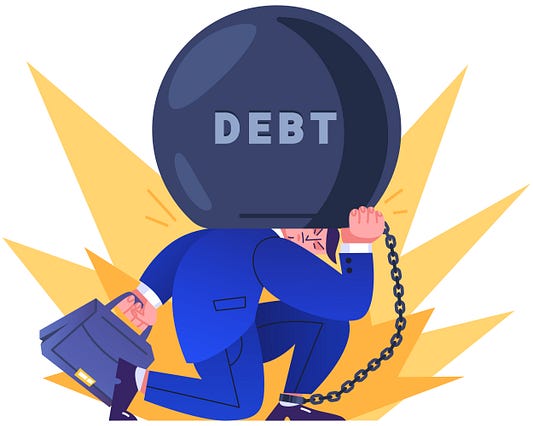Taking control of your finances
Debt can feel like a heavy burden, but with the right strategies and a clear plan, you can regain control of your finances.
Regardless of whether you are dealing with credit card debt, student loans, or a mortgage, there are effective ways to manage and reduce your debt.
In this article, we will look at various debt management strategies, prioritise debt repayment, and discuss negotiating with creditors.
Understanding Your Debt
Before we dive into strategies, it is crucial to understand the types of debt you’re dealing with. The following are some common forms of debt:
- Credit card debt:
Credit card debt is often the most pressing and costly form of debt for many.
High-interest rates can make it challenging to pay off, but we will discuss methods to tackle it. - Student loans:
Education is an investment, but student loans can linger for years. Knowing your options and repayment plans is essential. - Mortgages:
A home is a significant investment, and mortgages are usually long-term debts.
We will discuss how to manage this substantial financial commitment.
Now that we have identified the types of debt, let’s explore strategies to manage and reduce them effectively.
Managing Credit Card Debt

- Create a budget:
Begin by creating a monthly budget that outlines your income and expenses.
This will help you see where your money is going and identify areas where you can cut back to allocate more funds toward debt repayment. - Pay more than the minimum:
Paying only the minimum amount due on your credit card statement will keep you in debt for a long time.
Aim to pay as much as you can afford each month, ideally more than the minimum payment. - Consider a balance transfer:
If you have a high-interest credit card, look into transferring your balance to a card with a lower interest rate.
Just be sure to read the terms and conditions carefully to understand any fees or introductory rate periods. - Debt snowball or avalanche:
Two popular methods for tackling credit card debt are the debt snowball and debt avalanche methods.
In the snowball method, you pay off the smallest debt first and then move on to the next one.
In the avalanche method, you prioritise the debt with the highest interest rate.
Discussions about the ‘debt snowball or avalanche method’ is one that divides people — similar to the infamous debate we have here in the UK about what goes on top, jam or cream.
It very much depends on YOU. If you want the mental satisfaction of making progress, go for the snowball method — but if you want to pay less long term, go for the avalanche method.
Managing Student Loans
- Understand your loan terms:
Familiarise yourself with the terms of your student loans, including interest rates, repayment options, and grace periods.
This knowledge will help you make informed decisions. - Income-driven repayment plans:
If you are struggling with monthly payments, consider an income-driven repayment plan, which adjusts your payments based on your income and family size. - Refinancing:
Explore the option of loan refinancing, which can lower your interest rates and reduce your monthly payments.
However, be cautious as private loans may have different terms. - Extra payments:
If you can afford it, make extra payments towards your student loans. Even a little extra each month can make a significant difference in the long run.
Managing Mortgages

- Review your mortgage terms:
Take a close look at your mortgage agreement.
Understand the interest rate, the length of the loan, and any prepayment penalties. - Consider refinancing:
Mortgage rates fluctuate, so it is a good idea to keep an eye on them.
Refinancing your mortgage to a lower interest rate can save you money over the life of the loan. - Biweekly payments:
Making biweekly mortgage payments instead of monthly can help you pay off your mortgage faster and reduce the total interest paid.
Prioritising Debt Repayment
When you have multiple types of debt, it is essential to prioritise which to pay off first. General guidelines include:
- High-interest debt:
Start by tackling the debt with the highest interest rate, usually credit card debt.
High-interest debt can quickly spiral out of control. - Emergency fund:
Before aggressively paying down low-interest debt like student loans or mortgages, build an emergency fund to cover unexpected expenses. - Tax-advantaged retirement accounts:
Contribute to tax-advantaged accounts (like ISAs or retirement accounts in the UK or 401(k)s or IRAs in the US) — do your own research about these sorts of accounts in your country.
This is crucial for long-term financial security.
Negotiating With Creditors
If you are struggling to meet your debt obligations, don’t be afraid to negotiate with your creditors. Here is how to approach it:
- Contact your creditors:
Reach out to your creditors early if you anticipate trouble making payments.
Explain your situation honestly, and they may offer temporary relief, like lower interest rates or deferred payments. - Debt settlement:
In some cases, you may be able to negotiate a settlement where you pay a portion of the debt in exchange for having the rest forgiven.
Be aware that this can negatively impact your credit score. - Seek professional help:
If negotiations with creditors become overwhelming, consider working with a credit counselling agency or a debt settlement company.
Ensure you research and choose a reputable organisation.

In conclusion, it is clear that effective debt management is a journey that requires patience, discipline, and a clear plan.
It is never too late to start managing your debt, and with dedication, you can achieve financial freedom and peace of mind.
Start today, and take the first step toward a debt-free life.
Happy debt management!
If you would like to know more about finance and investing, feel free to check out the following list:
As always, if you have any other questions or thoughts, please feel free to add them to the responses section.
If you would like to stay connected, check out my website or follow me on my socials Linkedin & Instagram.
This article is for informational purposes only. It should not be considered Financial or Legal Advice. Not all information will be accurate. Consult a financial professional before making any major financial decisions.

